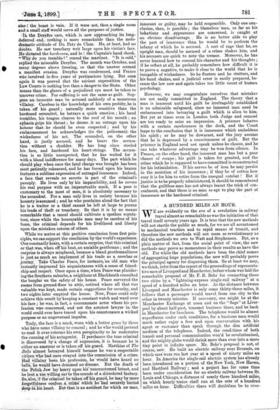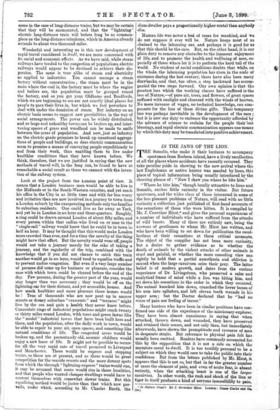A HUNDRED MILES AN HOUR.
WE are evidently on the eve of a revolution in' railway travel almost as remarkable as was the initiation of that travel itself seventy years ago. It is true that the new methods will not startle the public as much, for we are all accustomed to mechanical traction and to rapid means of transit, and therefore the new methods will not seem so revolutionary as did the methods_ we owe to Watt and Stephenson. But, as a plain matter of fact, from the social point of view, the new methods-may prove as momentous in their results as have the old. For while the old methods have been the chief means of aggregating huge populations, the new will probably prove the princiPal agency for dispersing them. So at least we may, we think, infer from the report of the. roceedings of representa- tive men of Liverpool and Manchester, before whom was laid the remarkable proposal of Mr. F. B. Behr for connecting.those two cities by a "lightning-express single-rail railway" at • a speed of a hundred miles an hour. As the distance between Liverpool and Manchester is only some thirty-three miles, it follows that a, passenger would, travel. from one city to the other in twenty minutes. If necessary, one might be at the Manchester Exchange at noon and on the "flags" at Liver- pciol 'by about half-past, transact business there, and be back in Manchester for luncheon. The telephone would be almost superfluous under such conditions, for a business man. would Much rather enjoy a free and open conversation with . his agent or customer than speak through the dim artificial medium of the telephone. Indeed, the: conditions of both transit and personal communication wou'd be revolutionised, and the mighty globe would shrink more than ever into a mere tiny point in infinite space. Mr. Behr's proposal is not, of course, nevi: He built an electric railway near Brussels, on which cars were run last year at a speed of ninety miles an hour. In America the single-rail electric system has already been introduced on a portion of thiNew Yoik, New Haven, and Hartford Railway ; and a project: has for some time been under consideration for an electric railway between St. Louis and Chicago, a distance of nearly three hundred miles, on which hourly trains shall run at the rate. of a hundred miles an heur. Difficulties there will doubtless be to over- . come in the case of long-distance trains, but we may be certain that they will be surmounted, and that the "lightning" electric long-distance train will before long be as common- place as the long-distance telephone, which in America already extends to about two thousand miles.
Wonderful and interesting as is this new development of rapid travel considered in itself, we are more concerned with its social and economic effects. As we have said, while steam railways have tended to the congestion of populations, electric railways would appear to be destined to achieve their dis- persion. The same is true alike of steam and electricity as applied to industries. You cannot manage a steam factory without concentration ; the steam must be in the main where the coal is, the factory must be where the engine and boilers are, the population must be grouped round the factory, and so you get your Oldhams and Bradfords, which we are beginning to see are not exactly ideal places for peop'e to pass their lives in, but which we feel powerless to deal with under the dominion of steam. But industry on an electric basis seems to suggest new possibilities in the way of social arrangements. The power can be widely distributed, and so large and unhealthy towns can be broken up, and inter- vening spaces of grass and woodland can be made to smile between the areas of population. And now, just as industry on the electric grade promises to break up unnatural aggrega- tions of people and buildings, so does electric communication seem to promise a means of conveying people expeditiously to and from their work, thus enabling them to live under healthier conditions than they have known before. We think, therefore, that we are justified in saying that the new methods of travel will, in the long run, be found to have as remarkable a social result as those we connect with the inven- tion of the railway system.
Look at the project from the London point of view. It means that a London business man would be able to live in the Midlands or in the South-Western counties, and yet reach his office in the City in as little time and with far less worry and irritation than are now involved in a journey to town from a London suburb by the exasperating methods only too familiar to suburban residents. One could live as far away as York, and yet be in London in an hour and three-quarters. Roughly, a ring could be drawn around London of about fifty miles, and every person within that radius who lived on or near to the " single-rail " railway would know that he could be in town in half an hour. It may be thought that this would make London more crowded than ever, and for a time the novelty of the thing might have that effect. But the novelty would wear off, people would not take a journey merely for the sake of taking a journey, and the regularity of the trip, combined with the knowledge that if you did not chance to catch this train another would go in an hour, would tend to equalise traffic and to prevent undue congestion. But even if a very large number of persons did come up for business or pleasure, consider the ease with which town could be cleared before the end of the day. Few persons, during the greater part'of the year, would stay longer than was necessary ; they would be off on the lightning-car for their distant, and yet accessible, homes. And how much healthier and more pleasant those homes would be ! Tens of thousands who are now pent up in narrow streets or dreary suburban " crescents " and " terraces " might live by the sea and gain a health they never knew before. Concentric rings of industrial populations might reach twenty or thirty miles round London, with trees and green lawns like the " model " industrial towns that have been built here and there, and the population, after the daily work in town, would be able to repair to pure air, open spaces, and something like natural conditions of life. The congested areas would be broken up, and the prematurely old, anaemic children would enjoy a new lease of life. It might not be possible to secure for all the very rapid rate of travel promised to Liverpool and Manchester. There would be express and stopping trains, as there are at present, and as there would be great competition for the seaside resorts and the more distant spots from which the through " lightning-express " trains would run, it may be assumed that rents would rise in those localities, and that people who wanted cheaper dwellings would have to content themselves with somewhat slower trains. But this equalising method -would be juster than that which now pre- vails, under which, according to Mr. Charles Booth, the slum-dweller pays a proportionally higher rental than anybody else.
Human life was never a bed of roses for mankind, and we do not suppose it ever will be. Nature keeps most of us chained to the labouring oar, and perhaps it is good for us that this should be the case. But, on the other hand, it is our plain duty to remove any obstacles to the innocent enjoyment of life, and to promote the health and wellbeing of men, es- pecially of those whose lot it is to perform the hard toil of the world. No student of social conditions doubts that while, on the whole, the labouring population has risen in the seale of existence during the last century, there have also been many drawbacks, and that, too often, a step backward has accom- panied the two steps forward. Our own opinion is that the greatest loss which the working classes have suffered is the loss of Nature,—of pure air, trees, and flowers, of great spaces suffused with sunlight and cleansed with the winds of heaven. No mere increase of wages, no technical knowledge, can com- pensate for the loss of these divine gifts. Their temporary loss was perhaps inevitable in the development of the race ; but it is now our duty to embrace the opportunity afforded by the advance of science to reclaim for the people their lost blessings, and rapid electric communication appears one means by which this duty may be translated into positive achievement.







































 Previous page
Previous page